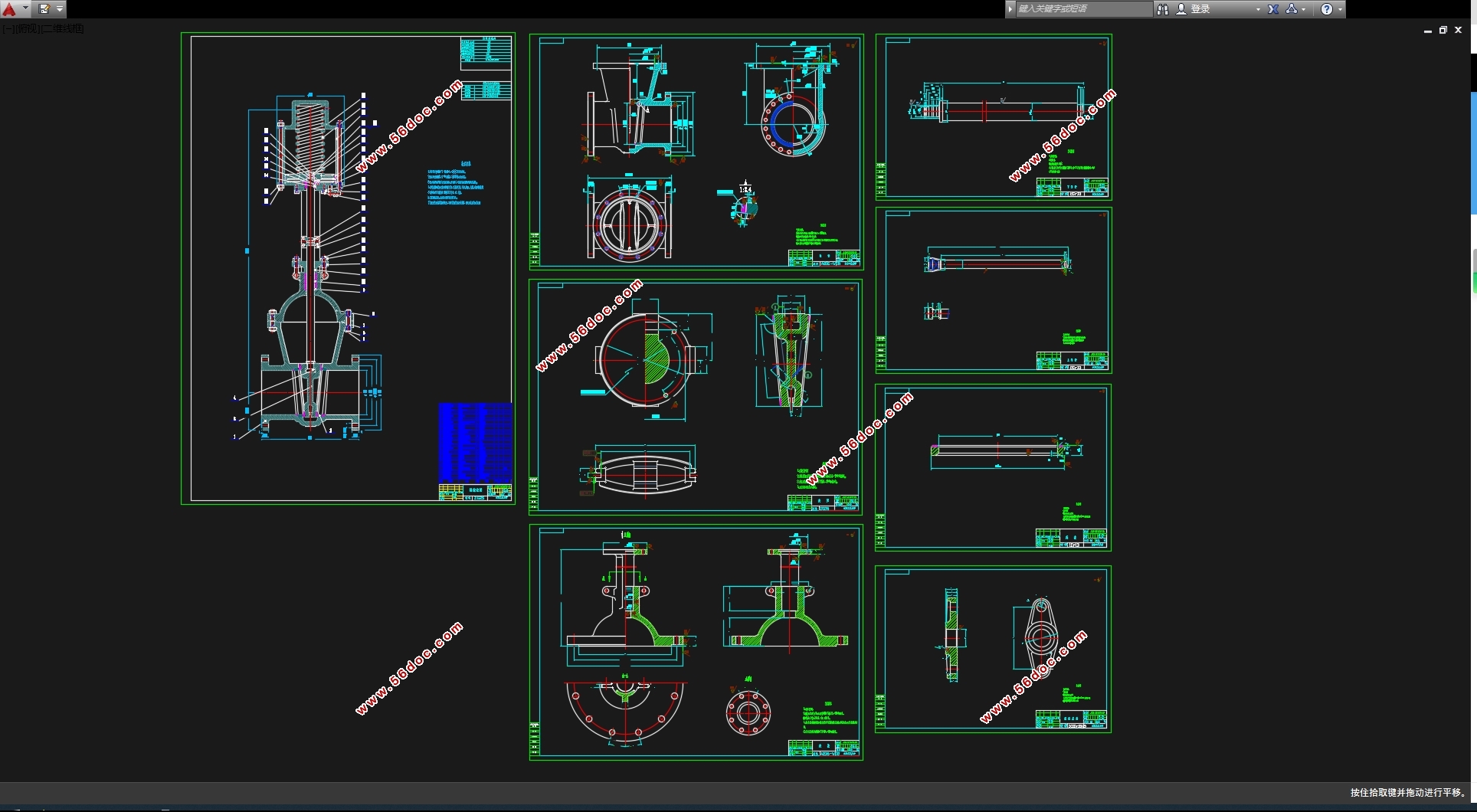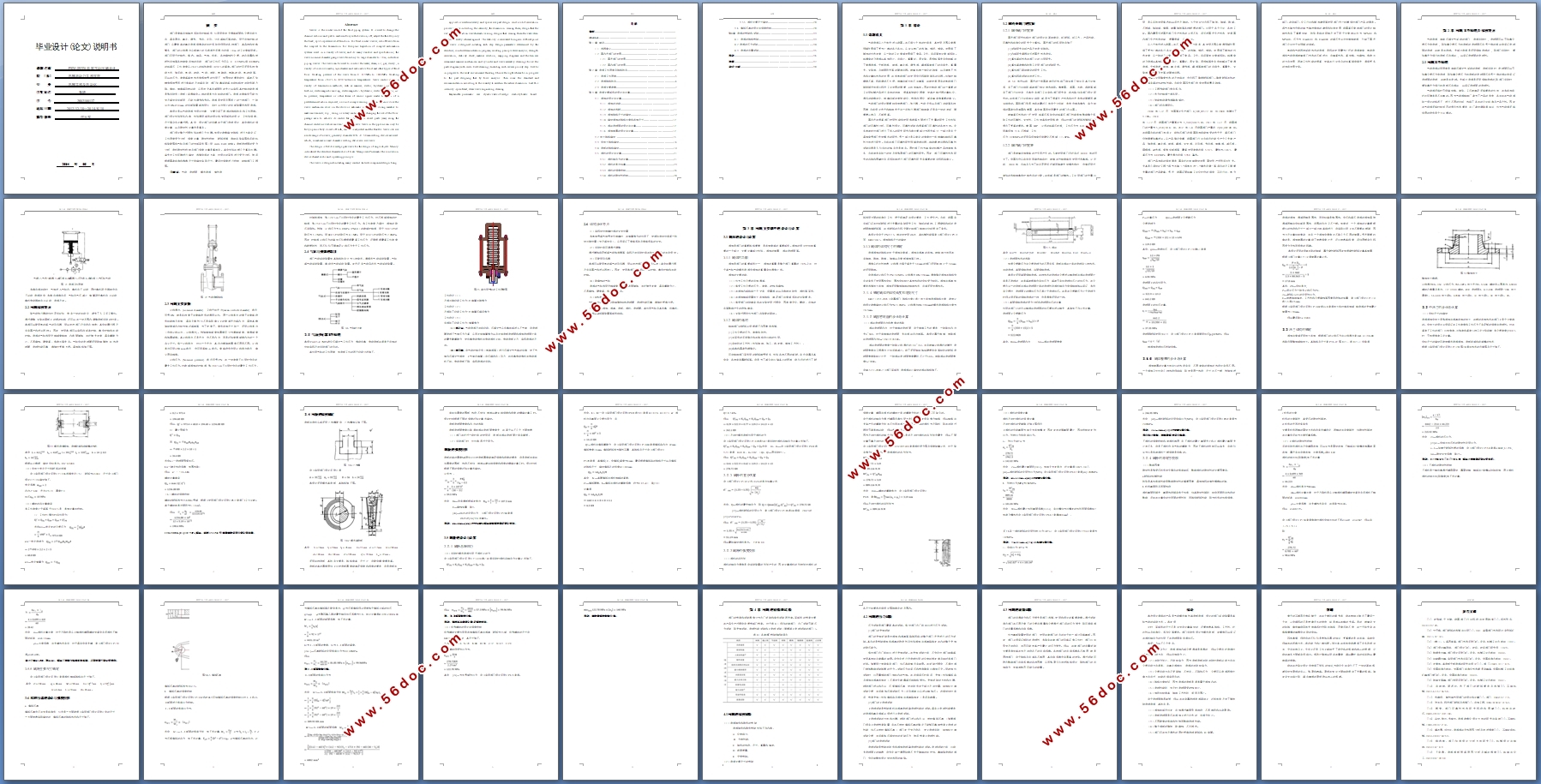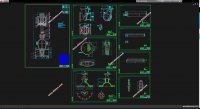PN50\DN350单缸气动闸阀设计(含CAD零件图装配图)(任务书,开题报告,论文说明书13000字,CAD图8张)
摘 要
阀门是管路流体输送系统中控制部件,它是用来改变通路断面和介质流动方向,具有导流、截止、调节、节流、止回、分流或卸压等功能。用于流体控制的阀门,从最简单的截止闸阀到复杂的自控系统中所用的各种阀门,其品种和规格繁多,阀门的公称通径从极微小的仪表阀大至通径达到 10m 的工业管路用阀。阀门可用于控制水、蒸汽、油品、气体、泥浆、各种腐蚀性介质、液态金属和放射性流体等各种类型流体的流动,阀门的工作压力可从 0. 013MPa到1000MPa 的超高压,工作温度从-269℃的超低温到1430℃的高温。阀门的控可采用多种传动方式,如手动、电动、液动、气动、涡轮、电磁动、电磁-液动、电-液动等;可以在压力、温度或其他形式传感信号的作用下,按预定的要求动作,或者不依赖传感信号而进行简单的开启或关闭,阀门依靠驱动或自动机构使启闭件做升降、滑移、旋摆或回转运动,从而改变其流道面积的大小以实现其控制功能闸阀是指关闭件(闸板)沿通路中心线的垂直方向移动的阀门。闸阀在管路中只能作全开或全关切断用,不能作调节和节流。闸阀是使用范围很广的一种阀门,一般口径DN≥50mm 的切断装置都选用它,有时口径很小的切断装置也选用闸阀。
本设计是以气动闸阀为设计对象,主要介绍了闸阀的结构特点和工作原理。阀门设计包括很多内容,包括通用部件的设计和专用部件的设计,又包括强度、尺寸等众多计算过程。其中,设计阀门的关键在于阀门密封设计,其中阀杆的强度计算,以及稳定性计算也是重点。
阀门设计整个过程包括这样几个步骤。按设计参数确定结构,进行方案论证,工作原理受力分析,强度计算,稳定性校核,材料选择,测绘总装备图和手动机构装配图和气缸及阀门的全部零件图(用 Auto CAD 绘制)。闸板密封面的受力分析,闸杆稳定性校核及阀门强度计算是重难点。其中包括这样几个重点步骤。首先对工作环境进行确定,选择合适的方案,对设计的零件进行受力分析;然后根据国家标准和推荐尺寸来确定实际尺寸;最后对强度进行校核,绘制阀门工程图。
关键词:气动 密封面 楔式闸阀 弹性闸
Abstract
Valves is the control unit of the fluid piping system. It is used to change the channel sections and put to medium flow, with diversion, off, adjust the throttle, only the back, split or pressure relief function. For fluid control valves, cut-off valve from the simplest to the Commission for Discipline Inspection of complex automation systems used in a variety of valves, and its many varieties and specifications, the valve nominal diameter gauge valve from tiny to large diameter to 10m, industrial piping valves. The valve can be used to control the water, steam, oil, gas, slurry, a variety of corrosive media, liquid metals and radioactive fluid and other types of fluid flow. Working pressure of the valve from 0. 013MPa to 1000MPa. Working temperature from -269℃ to 1430℃ultra-low temperatures. Valve control can be a variety of transmission methods, such as manual, electric, hydraulic, pneumatic, turbine, electromagnetic moving, electromagnetic - hydraulic, electro - hydraulic, etc. In pressure, temperature or other forms of sensor signals under the effect of a predetermined action required, or is not a simple sensing signal and open or close the valve mechanism relies on the drive or automatic opening and closing member to make movements, slip , swing or rotary motion. Thus changing the size of the flow passage area to achieve its control function.Valve is closed parts (ram) along the channel centerline vertical movement of the valve. Valve in the pipeline can only be fully open or fully closed off with, can not be adjusted and the throttle. Valve is to use a wide range of a valve, generally diameter DN ≥ 50mm cutting devices are used which, sometimes a small diameter cutting device also use valve.
The design is flexible wedge gate valve for the design of single objects. Mainly introduced the structure characteristics of Gate. Manpower-Pneumatic the conversion device characteristic and operating principle.
The valve is designed including many content. Include component design being
applied or used universally and special use part design. And a lot of calculation process such as including the intensity, the dimension. Among them, design that the valve key depends on valve hermetic sealing designs that. Among them the valve stem intensity secretly schemes against. The stability is calculated being also difficult point. The valve is designed including such step. Design parameters determined by the structure, conduct demonstration program, working principle stress analysis, strength calculation, stability check, material selection, mapping diagrams and the General Armament manual mechanism and cylinder and valve assembly drawings for all the parts diagram (with Auto CAD drawing).Including such several priority step. First be in progress to the work environment thinking. Choose the right scheme be in progress to the part designing that by force analysis. Then come the standard and recommendation according to the country to ascertain the actual dimension. Last the intensity is proofread, draw valve engineering drawing.
Keywords: pneumatic seal dyadic valve of wedge elasticity brake board
闸阀主要参数
公称通径:(nominal diameter),又称平均外径(mean outside diameter),表示符号DN,就是各种管子与管路附件的通用口径。同一公称直径的管子与管路附件均能相互连接,具有互换性.它不是实际意义上的管道外径或内径,虽然其数值跟管道内径较为接近或相等,为了使管子、管件连接尺寸统一,采用公称直径(也称公称口径、公称通径)。例如焊接钢管按厚度可分为薄壁钢管、普通钢管和加厚钢管。其公称直径不是外径,也不是内径,而是近似普通钢管内径的一个名义尺寸。每一公称直径,对应一个外径,其内径数值随厚度不同而不同。公称直径可用公制mm表示,也可用英制in表示。管路附件也用公称直径表示,意义同有缝管。
公称压力:(Nominal pressure),表示符号PN,在一定温度下应用时允许的最大工作压力。对碳钢阀体的控制阀,指200℃以下应用时允许的最大工作压力;
对铸铁阀体,指120℃以下应用时允许的最大工作压力;对不锈钢阀体的控制阀,指250℃以下应用时允许的最大工作压力。当工作温度升高时,阀体的耐压会降低。例如,公称压力为6.4MPa(PN64)的碳钢控制阀,用于300℃时的耐压为5.2MPa,用400℃时的耐压为4.1MPa,用于450℃时的耐压为2.9MPa。因此,控制阀公称压力的确定不仅要根据最高工作压力,还需根据最高工作温度和材质特性,而不仅仅只需满足公称压力大于工作压力。



目录
摘要------------------------------------------------------------------------------------------i
Abstract-------------------------------------------------------------------- ----------------ii
第1章 绪论-------------------------------------------------------------- -----------------1
1.1 选题意义------------------------------------------------------ ------------------1
1.2 国内外阀门的发展----------------------------------------- -------------------2
1.2.1 国外阀门的发展----------------------------------- --------------------2
1.2.2 国内阀门的发展--------------------------------- ----------------------2
第2章 闸阀工作原理及结构特点-----------------------------------------------------5
2.1 闸阀工作原理-------------------------------------------------------------------5
2.2 闸阀结构特点-------------------------------------------------------------------6
2.3 闸阀主要参数-------------------------------------------------------------------7
第3章 闸阀主要部件的设计与计算-------------------------------------------------11
3.1 阀体的设计与计算-----------------------------------------------------------11
3.1.1 阀体的功能------------------------- ----------------------------------11
3.1.2 阀体的选材------------------------------------ -----------------------11
3.1.3 阀体结构尺寸的确定--------------------- --------------------------12
3.1.4 确定阀体的结构长度和连接尺寸------ --------------------------12
3.1.5 阀座密封面的设计与计算------ ------------------------- ---------12
3.1.6 阀体壁厚的设计与计算------ ------------------------- ------------12
3.2 法兰结构确定 ---------------------------------------------------------------15
3.3 中法兰结构确定--------------------------------------------------------------16
3.4 闸板的结构确定--------------------------------------------------------------19
3.5 阀杆的设计与计算-----------------------------------------------------------21
3.5.1 阀杆轴向力的计算---------------------------------------------------21
3.5.2 阀杆的直径估算------------------------------------------------------23
3.5.3 阀杆的强度校核------------------------------------------------------26
3.5.4 阀杆的稳定性校核---------------------------------------------------28
3.5.5 阀杆主要尺寸确定---------------------------------------------------28
3.6 填料压盖的设计与强度校核-----------------------------------------------28
第4章 闸阀的检验和试验-------------------------------------------------------------33
4.1 闸阀的结构检验--------------------------------------------------------------33
4.2 闸阀的压力试验--------------------------------------------------------------34
4.3 闸阀的流量试验--------------------------------------------------------------35
结论--------------------------------------------------- -------------------------------------36
致谢--------------------------------------------------- -------------------------------------37
参考文献-------------------------------------------- --------------------------------------38
|







